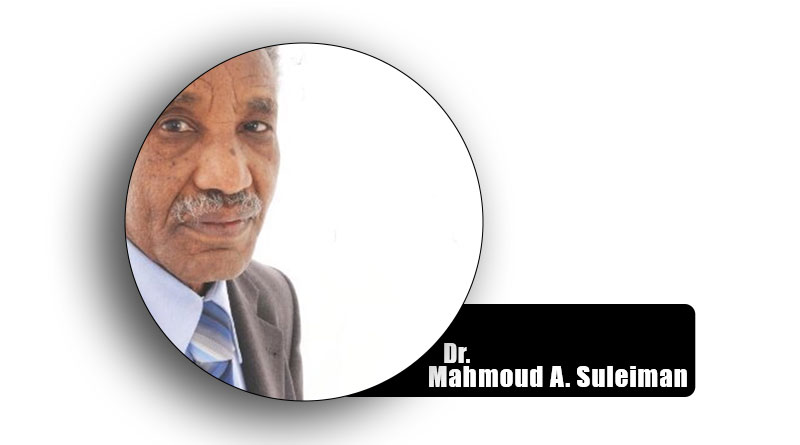What are the criteria of the Revolution Concept that the Sudanese People might have missed to meet during their uncountable uprisings against the Military Coup d’états?
ما هي معايير مفهوم الثورة التي ربما فات على الشعب السوداني الايفاء بها خلال انتفاضاتهم التي لا تعد ولا تحصى ضد الانقلابات العسكرية؟
Written by Mahmoud A. Suleiman
The Sudanese people have been languishing under military dictatorships since the dawn of the Anglo-Egyptian independence on January 1, 1955, and the first military coups took place in November 1958 under the leadership of General Ibrahim Abboud, followed by the coup of Jaafar Muhammad Nimeiri and then came the great disaster with the advent of doom with the coup of the Islamic movement attributed to the international Muslim Brotherhood on September 30, 1989. During the period that followed the independence of Sudan, a number of military coups took place, which did not allow the people of Sudan to enjoy freedom because the military dictatorships were coming to steal the achievements of the people of Sudan in their revolutions and uprisings during which the Sudanese people chanted the slogans of Freedom, Peace and Justice. Looking at the foregoing narrative, one would ask himself as to whether the Revolutions and Uprisings of Sudanese Peoplehave fulfilled the requirements of the Revolution Concept or otherwise?
The Upcoming loaded question is what are the criteria of the Revolution Concept that the Sudanese People might have missed to meet during their uncountable uprisings against the Military Coup d’états. And in our current circumstances, we, the Sudanese, have to wonder whether, in our many revolutions, we have fulfilled the covenant and stood against the thieves of our achievements by the opportunists, as is happening now for our glorious December revolution, and was the military able to steal it as in the past
According to Arabic content encyclopedia resource Revolution is nothing but ehttps://mssader.com/
Revolution is defined as follows:
Revolution is a term derived from the triple verb (revolt), meaning anger, and it has become sharp in dealing in order to achieve a goal. What, also known, as: a political and social movement linked to the citizens of a country, and through which they try to convey their opinions and ideas to the ruling authority in their country, and the revolution may be limited to sit-ins, or repeated chants, and the people who participate in the revolution are called (revolutionaries, or demonstrators) .
The emergence of the concept of revolution
The emergence of the concept of revolution dates back to ancient Greek times; The Greek philosopher Plato was interested in studying the political changes that occur based on the actions of citizens, and he wrote many explanations about the revolution, the ideas associated with it, and its goals based on the views that he formed after studying the reality of revolutions in his time.
After that, the philosopher Aristotle studied the concept of revolution based on the analysis of regimes, and how they deal with justice and equality with members of the people, and saw that the application of democracy within the state contributes to reducing the possibility of a revolution, and decided to divide the revolution into two parts: the first aims to change the ruling regime of the state, and the second Only the state constitution is changed.
The Middle Ages, especially since the eighteenth century AD, is the beginning of the emergence of the concept of revolution in its common sense, and this appeared in the French Revolution that erupted in 1789 AD, which led to the change of the French system of government, and then followed by many other revolutions that led to the occurrence of Many changes that have significantly affected history.
Characteristics of the revolution
There are a number of characteristics associated with the revolution, including:
Types of revolution
The revolution is divided into a group of types or patterns that depend on several factors that lead to its occurrence, including:
Political revolution
It is the revolution that is associated with a specific political thought, and a group of people seeks to implement it within the country in which they are located. Usually, these individuals succeed in implementing their ideas with popular support for them, due to the media campaigns they carry out aimed at clarifying the nature of their political ideas. The types of political revolutions that took place in the twentieth century when both socialist thought and capitalist thought appeared and individuals belonging to each thought tried to implement their ideas in the countries in which they were present.
Social revolution
It is one of the most widespread types of revolutions, as it is linked to the role of the people in influencing decision-making within their state, and this is what led to making its role important and pivotal. It is characterized as a popular revolution consisting of all segments of society, and those who participate in it in an effective manner in order to achieve a set of goals that contribute to improving their social status, examples of which are: the January 25 revolution that took place in Egypt.
BENJAMIN FRANKLIN THE FOUNDING FATHER OF THE UNITED STATES OF AMERICA 1706 -1790, WHO WAS A POLYMATH, INVENTER, SCIENTIST, PRINTER, POLITICIAN, FREEMASON AND DIPLO AND WHO HELPED DRAFT THE DECLARATION OF INDEPENDENCE AND CONSTITUTION. HE ALSO NEGOTIATED THE 1783 TREATY OF PARIS WHICH ENDED THE REVOLUTIONARY WAR, HAS BEEN QUOTED AS SAYING: HAS BEEN QUOTED AS SAYING:”REBELLION AGAINST TYRANTS IS OBEDIENCE TO GOD”
Dr. Mahmoud A. Suleiman is an author, columnist and a blogger. His blog is http://thussudan.wordpress.com/

